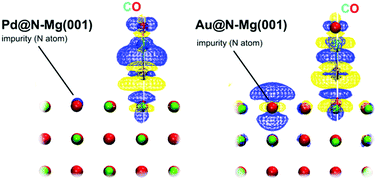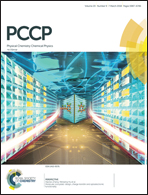Tunable reactivity of supported single metal atoms by impurity engineering of the MgO(001) support
Abstract
Development of novel materials may often require a rational use of high price components, like noble metals, in combination with the possibility to tune their properties in a desirable way. Here we present a theoretical DFT study of Au and Pd single atoms supported by doped MgO(001). By introducing B, C and N impurities into the MgO(001) surface, the interaction between the surface and the supported metal adatoms can be adjusted. Impurity atoms act as strong binding sites for Au and Pd adatoms and can help to produce highly dispersed metal particles. The reactivity of metal atoms supported by doped MgO(001), as probed by CO, is altered compared to their counterparts on pristine MgO(001). We find that Pd atoms on doped MgO(001) are less reactive than on perfect MgO(001). In contrast, Au adatoms bind CO much more strongly when placed on doped MgO(001). In the case of Au on N-doped MgO(001) we find that charge redistribution between the metal atom and impurity takes place even when not in direct contact, which enhances the interaction of Au with CO. The presented results suggest possible ways for optimizing the reactivity of oxide supported metal catalysts through impurity engineering.



 Please wait while we load your content...
Please wait while we load your content...